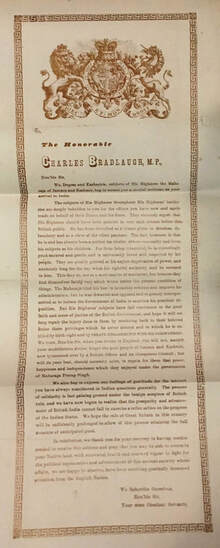
This wonderful - and sizable - printed document (there's a full transcript below) is an address from 'Dogras and Kashmiris' on behalf of their maharaja, Pratap Singh, the penultimate Dogra princely ruler of the state whose reign began in 1885.
Pratap Singh was seen by many of his subjects as tyrannical and was reported to be addicted to opium, though it was his alleged contacts with the Russians which prompted the British to divest him of all but nominal powers in April 1889. This unprecedented British interference in one of the larger princely-ruled Indian States caused consternation among the many hereditary rulers
Bradlaugh was a deeply controversial figure - a Liberal radical, but more than that an atheist and a republican and inveterate campaigner and orator. He was described as the 'Member for India' because of his interest in Indian affairs and was critical of the consequences of Empire, whether in India or Ireland or elsewhere.
He seems to have taken notice of the address - and on his return to London asked a question in Parliament about Pratap Singh and the state of affairs in Kashmir. It curious that an arch republican should have taken up the cause of a hereditary despot but Bradlaugh's interest in the issue is credited with being at least in part responsible for the partial restoration of Pratap Singh to at least a measure of authority in 1891, and to a fuller role as Kashmir's ruler in 1905.
This address is among the Charles Bradlaugh papers kept at the wonderful Bishopsgate Institute in London - my thanks for their permission to post the document here.
ANDREW WHITEHEAD
Charles Bradlaugh, M.P.
We, Dogras and Kashmiris, subjects of His Highness the Maha-
raja of Jammu and Kashmir, beg to accord you a cordial welcome on your
arrival in India.
The subjects of His Highness throughout his Highness' territo-
ries are deeply beholden to you for the efforts you have now and again
made on behalf of their Prince and his State. They sincerely regret that
His Highness should have been painted in very dark colours before the
British public. He has been described as a tyrant given to drunken de-
bauchery and as a slave of the vilest passions. The fact, however, is that
he is and has always been a perfect tee totaler, abhors sensuality and loves
his subjects as his children. Far from being tyrannical, he is exceedingly
good natured and gentle, and is universally loved and respected by his
people. They are greatly grieved at his unjust deprivation of power, and
anxiously long for the day when his rightful authority may be restored
to him. This they do, not as a mere matter of sentiment, but because they
find themselves faring very much worse under the present condition of
things. The Maharaja tried his best to introduce reforms and improve his
administration, but he was thwarted and opposed, and so gravely misrepre-
sented as to induce the Government of India to sanction his practical de-
position. But His Highness' subjects have full confidence in the good
faith and sense of justice of the British Government, and hope it will ere
long repair the injury done to them by rendering back to their beloved
Ruler those privileges which he never abused and to which he is en-
titled by birth right and by TREATY ENGAGEMENTS WITH HIS FOREFATHERS.
We trust, Hon'ble Sir, when you return to England, you will not, amidst
your multifarious duties, forget the poor people of Jammu and Kashmir,
now tyrannised over by a British Officer and an obsequious Council; but
will do your best, should necessity arise, to regain for them that peace,
happiness and independence which they enjoyed under the government of
Maharaja Pratap Singh.
We also beg to express our feelings of gratitude for the interest
you have always manifested in Indian questions generally. The process
of solidarity is fast gaining ground under the benign auspices of British
rule, and we have now begun to realise that the prosperity and advance-
ment of British India cannot fail to exercise a reflex action on the progress
of the Indian States. We hope the rule of Great Britain in this country
will be sufficiently prolonged to allow of this process attaining the full
measure of anticipated good.
In conclusion, we thank you for your courtesy in having condes-
cended to receive this address and pray that you may be able to return to
your Native land. with renovated health and renewed vigour to fight for
the political regeneration and advancement of this ancient country whose
affairs, we are happy to observe, have been receiving gradually increased
affection from the English Nation.
Hon'ble Sir,
Your most Obedient Servants,
 RSS Feed
RSS Feed